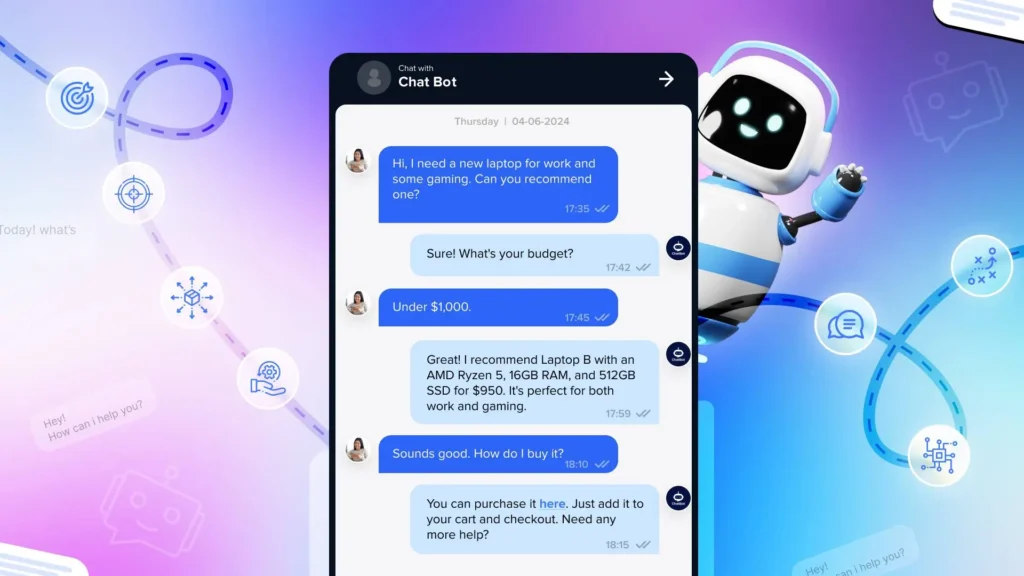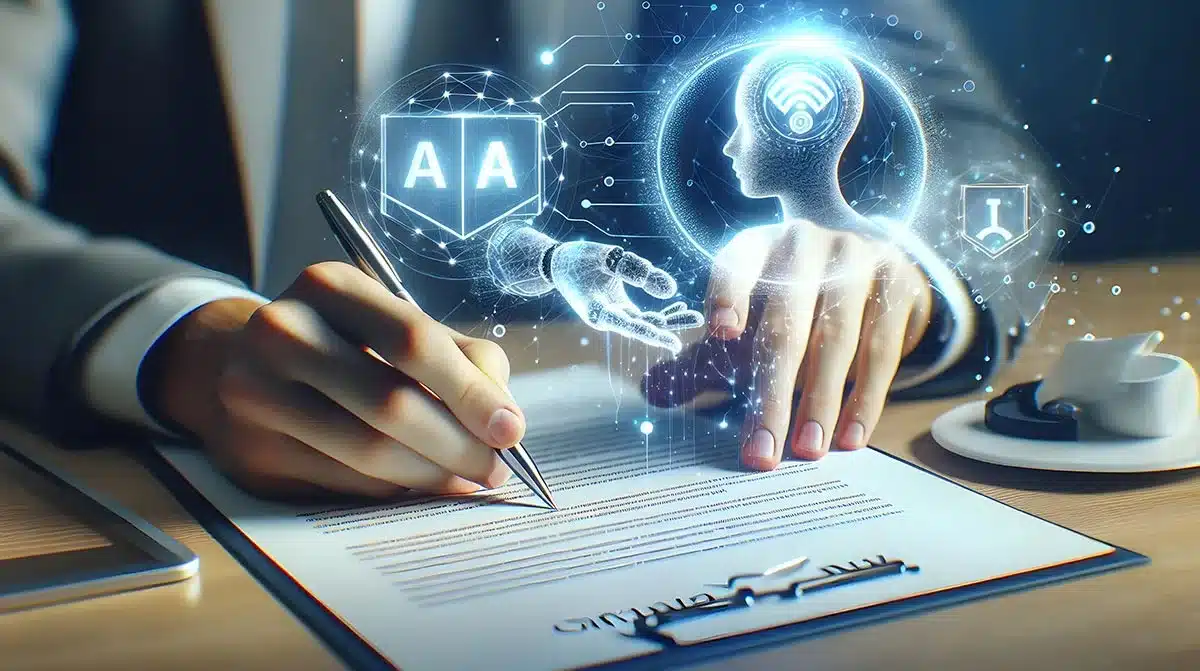Introduction
In today’s digital age, where customer expectations are sky-high, businesses constantly seek innovative ways to enhance customer experience (CX). Enter chatbots – virtual assistants that are revolutionizing the customer support landscape.
Chatbots have the potential to take the entire customer service industry by storm. The chatbot market is experiencing an explosive growth.
A recent study predicts the global chatbot market will reach $18.7 billion by 2030. This surge reflects a significant rise in adoption rates a report suggests that around 58% of businesses in the B2B sector use chatbots.
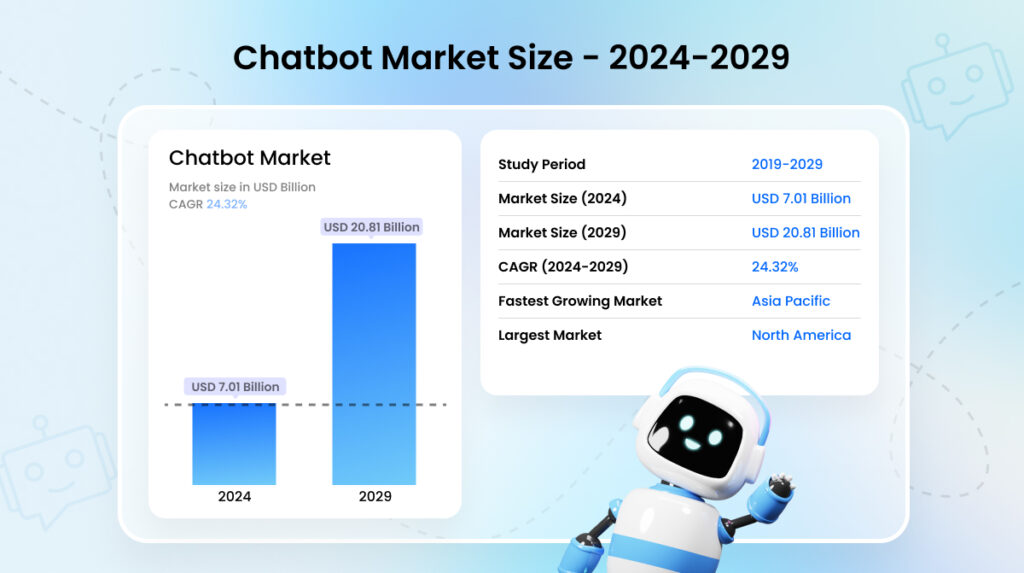
Source: https://www.mordorintelligence.com/industry-reports/global-chatbot-market What are the Technologies Powering AI Chatbots?
The power of chatbots lies in integrating cutting-edge technologies, including Natural Language Processing (NLP), Machine Learning (ML), and AI technology.
Natural Language Processing (NLP) enables chatbots to understand and interpret human language, recognize user intent, and extract relevant entities from queries. This technology is crucial for seamless communication between humans and chatbots.
Machine Learning (ML) algorithms, including supervised, unsupervised, and reinforcement learning techniques, allow chatbots to continuously learn and improve from interactions, providing more accurate and relevant responses.
Conversational AI takes chatbot capabilities a step further by incorporating context awareness, sentiment analysis, and personalization. This technology helps chatbots understand the context of a conversation, detect the user’s emotional state, and tailor responses accordingly, resulting in more natural and engaging interactions.

Why Do You Need AI Chatbots for Customer Support?
AI chatbots have become indispensable for modern customer support due to several key advantages:
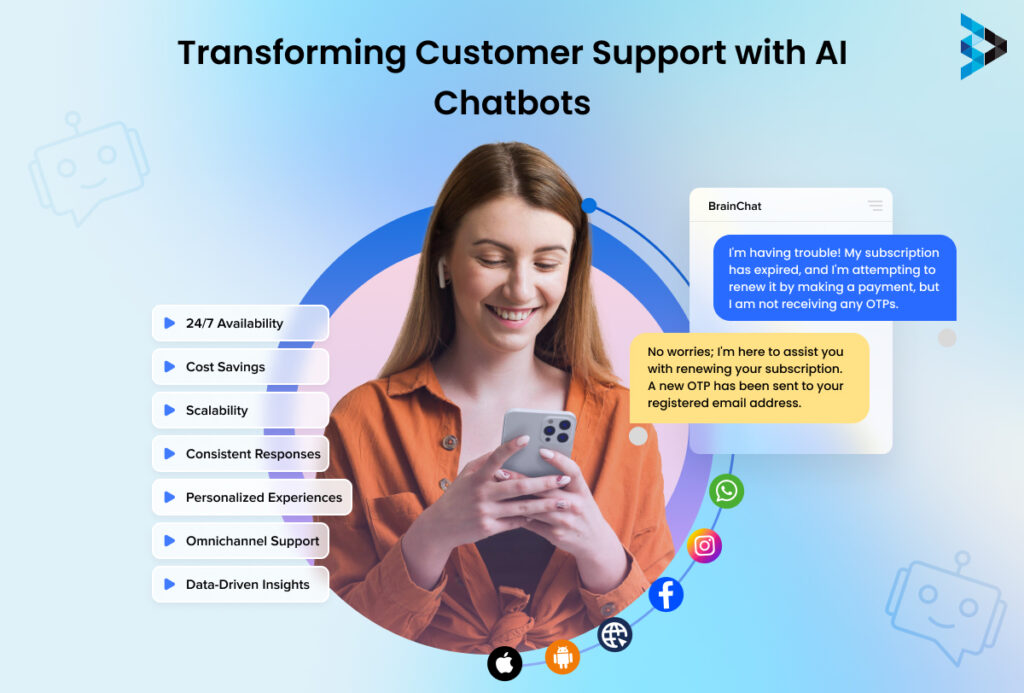
- 24/7 Availability: Chatbots operate round-the-clock, ensuring customers receive immediate assistance anytime, anywhere.
- Cost Savings: Deploying chatbots can significantly reduce operational costs associated with traditional customer service channels.
- Scalability: Chatbots can handle multiple conversations simultaneously, scaling to meet fluctuating customer demand effortlessly.
- Consistent Responses: By leveraging pre-defined knowledge bases, chatbots provide consistent and accurate information across all interactions.
- Personalized Experiences: Through machine learning and data analysis, chatbots can personalize their responses based on customer preferences and behavior.
- Omnichannel Support: Chatbots can seamlessly integrate with various communication channels, such as websites, mobile apps, and messaging platforms, offering a unified customer experience.
- Data-Driven Insights: Chatbot interactions generate valuable data that businesses can analyze to identify pain points, optimize processes, and improve customer satisfaction. Businesses can use a knowledge base software like Helpjuice to further streamline this process by organizing and managing information effectively.
Use Cass: Transforming Customer Service with AI Chatbots
Ai chat bots are revolutionizing customer service across various industries, offering innovative solutions and enhancing customer experiences:
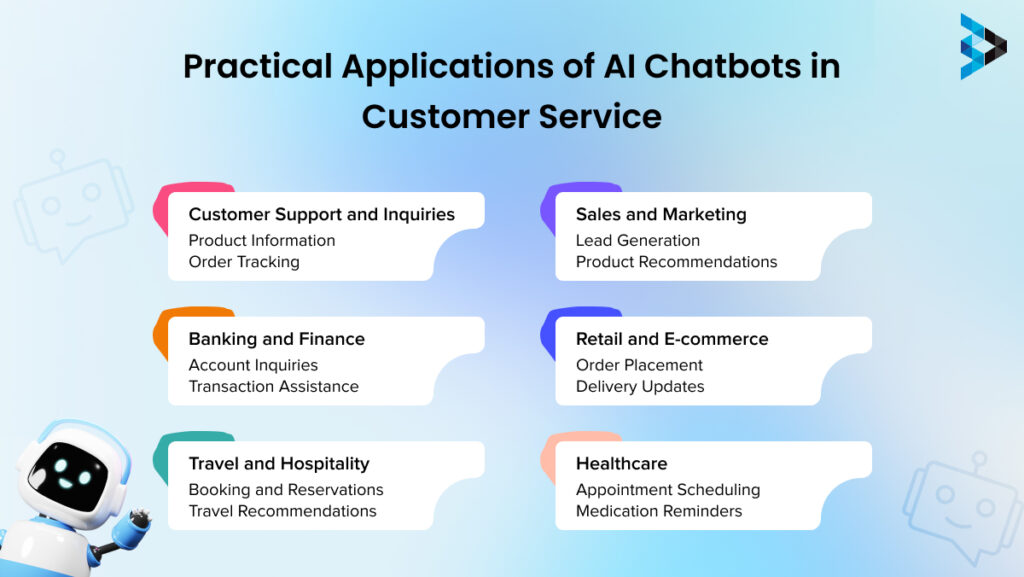
Customer Support and Inquiries:
Product Information: Chatbots leverage vast product databases to provide in-depth specifications, compare features across models, and guide customers in selecting the right products.
For example, an electronics retail chatbot could explain the technical specifications of different laptop models based on the customer’s needs, such as portability, processing power, or graphics capabilities.
Order Tracking: With chatbots, customers can simply ask, “Where is my order?” and get up-to-date shipping information pulled from logistics systems.
The chatbot could respond: “Your order (#1234) is out for delivery today and is scheduled to arrive by 5 PM at your address.”
Troubleshooting: Powered by knowledge bases, chatbots diagnose and resolve common product/service issues through dynamic conversations.
A cable TV provider’s chatbot could ask about the specific error, guide the customer through basic troubleshooting steps for that issue, and escalate to a technician if the issue remains unresolved.
FAQ Assistance: Customers get answers to frequently asked questions by describing their query to chatbots in natural language.
For instance, an e-commerce fashion chatbot could accurately respond to “What is your return policy for shoes?” with the relevant policy details.
Sales and Marketing:
Lead Generation: Website chatbots engage visitors with friendly greetings, capture contact information, and inquire about their interests to qualify leads.
An IT services firm’s chatbot could ask employed professionals, “What software/tools is your company using?” to identify potential leads.
Product Recommendations: eCommerce chatbots track customer searches, purchases, and stated preferences to provide tailored product suggestions.
A beauty retailer’s chatbot could recommend: “Based on the moisturizer you bought, you may also like our vitamin C serum for brighter skin.”
Promotional Campaigns: Travel chatbots notify customers of promotional vacation packages based on their interests and previous bookings.
For example: “Since you visited Paris last year, check out our 6-night London city break deal, including hotels and attraction passes.”
Banking and Finance:
Account Inquiries: Bank customers can query chatbots like “What were my last five transactions?” or “How much was my recent transfer to my savings account?”
Chatbots retrieve and relay the specific transaction details.
Transaction Assistance: Conversational banking chatbots guide customers step-by-step for transactions like “I want to pay my utility bill from my checking account” and provide clarity on processes.
Loan/Credit Applications: Bank chatbots streamline lending processes by collecting required documentation and information through conversations instead of lengthy forms expediting applications.
Retail and E-commerce:
Order Placement: Customers tell e-commerce chatbots what they need: “I want to buy a new running shoe for gym workouts.” The chatbot suggests options based on preferences and walks them through checkout.
Order Tracking: With a simple “Where is my makeup order?” retail chatbots provide live order statuses like “Your order is out for delivery and will reach you by 8 PM today.”
Product Recommendations: Gaming chatbots analyze preferences and buying patterns to suggest games/upgrades. For example: “Since you enjoyed GTA 5, you may like buying Red Dead Redemption 2”.
Delivery Updates: Retail chatbots keep customers informed with updates like “Your package is delayed by one day due to bad weather and will be delivered on June 15th now.”
Travel and Hospitality:
Booking and Reservations: Travel chatbots assist in booking flights, hotels, and cars by understanding requirements like “I need a hotel in Las Vegas for two nights, June 10-12 for two adults.”
Travel Recommendations: A foodie planning a trip to Italy could get personalized suggestions from a chatbot: “Based on your interests, I’d recommend taking a cooking class in Rome and visiting these wineries in Tuscany.”
Local Information: Hotel chatbots greet guests with recommendations like “Welcome to Chicago! Top attractions near you are Millennium Park, Navy Pier, and the Art Institute.”
Healthcare:
Appointment Scheduling: A patient could simply tell a clinic’s chatbot, “I need to schedule a physical exam,” and it would verify insurance and doctor availability and book their preferred slot.
Medication Reminders: Pharmacy chatbots track medication schedules and send reminders like “It’s time for your 8 AM dosage of Lisinopril. Have you taken it today?”
Symptom Checking: Patients describe their symptoms to healthcare chatbots, which follow a diagnostic decision tree to determine the severity and need for an in-person visit.
Post-Procedure Guidance: A surgery chatbot could provide post-op instructions, such as: “For your knee surgery recovery, keep the leg elevated, apply ice regularly, and take these prescribed pain medications.”

Benefits of AI-Powered Chatbots in Customer Service
Implementing AI-powered chatbots in customer service offers numerous benefits for businesses and customers alike:
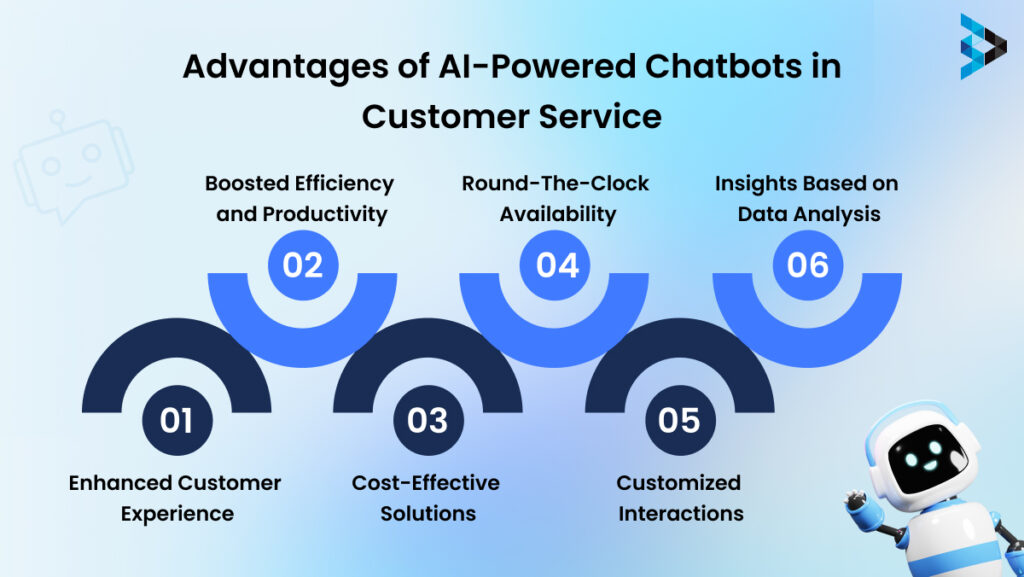
- Improved customer experience
With instant responses, personalized interactions, and 24/7 availability, chatbots enhance the overall customer experience, leading to increased satisfaction and loyalty.
- Increased efficiency and productivity
By automating repetitive tasks and managing large volumes of inquiries, chatbots enable human agents to concentrate on more intricate issues, enhancing workforce efficiency and productivity.
- Cost savings
Chatbots can significantly reduce operational costs associated with traditional customer service channels, such as call centers and physical support desks.
- 24/7 availability
Chatbots ensure customers receive assistance anytime, eliminating wait times and providing immediate solutions.
- Personalized interactions
Through machine learning and data analysis, chatbots can personalize their responses based on individual customer preferences, behaviors, and past interactions, fostering a more engaging and tailored experience.
- Data-driven insights
Chatbot interactions generate valuable data that businesses can analyze to identify pain points, optimize processes, improve products or services, and enhance customer satisfaction.
Final Thoughts
By leveraging the power of AI chatbots, businesses can revolutionize their customer service operations, providing efficient, personalized, and seamless experiences that meet the demands of today’s digital landscape. As chatbot technology advances, we can expect even more innovative solutions that transform how businesses interact with and support their customers.
Read more: Crafting Perfection: AI’s Impact on the Jewelry Industry.
FAQs
AI chatbots are computer programs that use natural language processing, machine learning, and conversational AI to understand and respond to customer queries in a human-like manner.
In customer service, chatbots can handle a wide range of tasks, such as answering common questions, providing product information, and guiding customers through troubleshooting processes.
The primary advantages of using AI chatbots for customer service include 24/7 availability, cost savings, scalability, consistent responses, personalized interactions, omnichannel support, and data-driven insights that can help improve customer experiences and business operations.
Although chatbots excel at managing numerous routine tasks and inquiries, they are not intended to supplant human customer service representatives entirely. Human agents will still play a crucial role in complex issues or situations requiring empathy and emotional intelligence.
While chatbots are constantly improving, they still have limitations. They may struggle with understanding complex language or handling highly technical or nuanced queries.
Additionally, they may be unable to provide the same level of emotional support or empathy as human agents in certain situations.
To ensure a positive customer experience with chatbots, businesses should invest in high-quality natural language processing and machine learning technologies, continuously train and update the chatbots with relevant data, and integrate them seamlessly with other customer service channels. Regular monitoring and improvement based on customer feedback are also essential.
The cost of implementing an AI chatbot for customer service can vary significantly depending on factors such as the chatbot’s complexity, the platform or technology used, the level of customization required, and the integration with existing systems.
Costs can range from a few thousand dollars for basic chatbots to hundreds of thousands for highly advanced and customized solutions.
Security is a critical consideration when using AI chatbots for customer service. Businesses should implement robust data encryption, secure authentication protocols, and regular security audits to protect customer data and prevent unauthorized access or misuse of the chatbot system.
AI chatbots are rapidly evolving, and their capabilities are expected to become even more advanced in the future. We can anticipate chatbots with improved natural language understanding, better context awareness, and the ability to handle more complex queries and tasks.
Additionally, integrating emerging technologies such as computer vision and augmented reality could enhance the customer experience by enabling visual assistance and interactive product demonstrations.
Using AI chatbots for customer service is generally considered ethical if certain principles are followed. Businesses should be transparent about customers interacting with a chatbot and not a human agent.
Chatbots should never attempt to deceive or mislead customers. Additionally, proper measures must be in place to protect customer data privacy and security. Chatbots can significantly improve customer experiences and business operations when used responsibly and ethically.
Related Articles
-
The AI Marketing Playbook: Decoding Secrets from the Visionaries
The ground beneath marketing is shifting. Not subtly, not slowly, but with the tectonic force of a technological revolution unlike any we’ve witnessed before. Forget simply “adopting” AI; we are
-
Custom LLMs: Tailoring Language Models to Your Business Needs
Artificial intelligence (AI) has transformed numerous industries, from customer service to data analysis. However, the effectiveness of AI models depends mainly on their adaptability and accuracy. Custom Large Language Models
-
How Generative AI Is Revolutionizing Contract Review: Faster Approvals, Lower Risk
Contracts can make or break deals, partnerships, and even business units. Yet for decades, reviewing them has been one of the job’s most tedious and frustrating parts. Legal teams and

